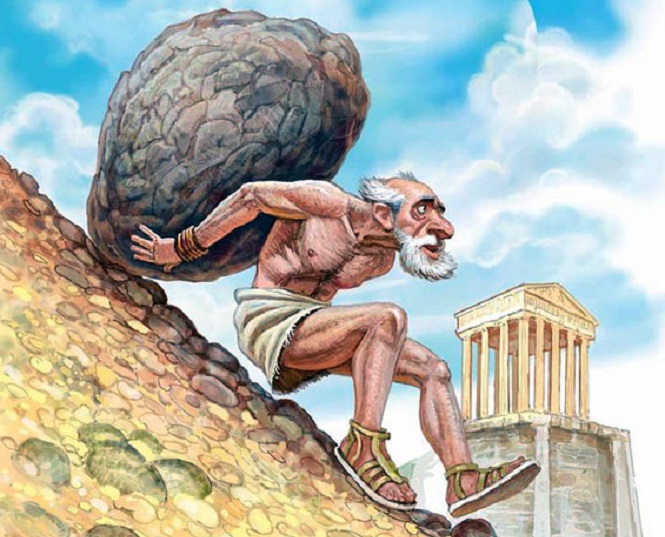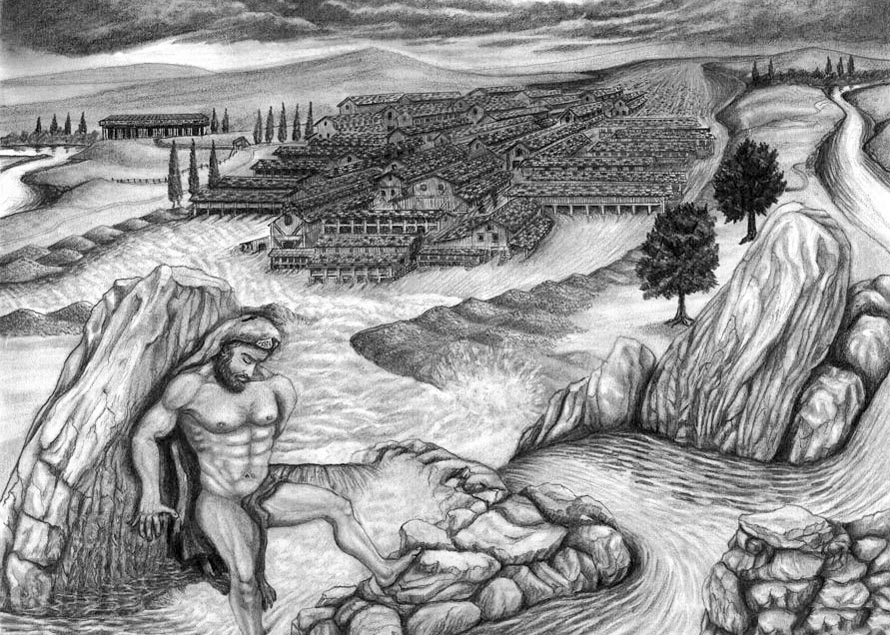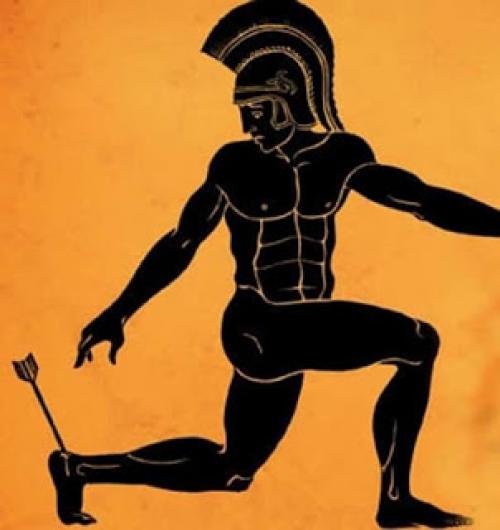Sisyphus's work is useless, hard work, barren work.
The expression appeared from the ancient Greek tradition of Sisif (Sisyphus), a famous cunning man who was able to deceive even the gods and constantly entered into conflicts with them.
It was he who managed to chain Tanatos, the god of death sent to him, and to keep him imprisoned for several years, so that people did not die.
For his actions Sisyph was severely punished in Aida - he had to roll a heavy stone on the mountain, which, reaching the top, inevitably fell down, so that all the work had to start again.

Pandora's box is the source of multiple misfortunes, disasters. From the ancient Greek myth of Pandora, according to which people once lived without knowing any misfortunes, disease and old age, until Prometheus stole fire from the gods. For this, the angry zevs sent a beautiful woman to the ground - Pandora; she received from God a casket in which all human misfortunes were locked. Despite Prometheus's warning not to open the casket, Pandora, instigated by curiosity, opened it and scattered all the misfortunes.
Gordiev knotmore] - intractable, confusing business, task, some difficulties. Also Cut (cut) Gordiev knot - to solve a complex complicated issue boldly, decisively and immediately. From the name of a complex, tangled knot tied, according to one of the legends, by the Frigian king Gordius, which no one was able to untie. According to the oracle's prediction, the oracle who managed to untangle this knot was to become the ruler of all Asia. Legend, told by ancient Greek writers, tells that only Alexander the Great managed to do it - he cut the knot with a sword in half.
Annibalova(Hannibalova)Oath
A firm determination to fight to the end, a promise to continue to follow their ideals.
The expression came from ancient history. Carthaginian general Annibal (Hannibal) being ten years old, before the altar swore to his father to be an unapologetic enemy of Rome and kept the oath.
"I had to get away from my enemy so that they would let me attack him more strongly... This enemy was serfdom. Under this name I gathered and concentrated everything against which I decided to fight to the end - with which I swore never to reconcile. It was my annibal oath." I.S. Turgenev
The promise of the revolutionaries Herzen and Ogarev to fight the tsarist regime is annibalova's oath.
Avgiev stables 1. heavily clogged, polluted place, usually a room where everything is in disarray; 2. what is in a very neglected state, in disarray, etc. Usually about any organization, about a complete mess in the conduct of affairs. From the name of the huge buzzard of the Elid king Avgia, not purged for many years. Cleaning them was possible only the mighty Heracle - the son of zeus. The hero cleared the Augean stables in one day, sending water from two turbulent rivers through them.

Achilles heel
The greatest hero of ancient Greece the legendary Achilles was, According to the tradition, the son of the sea goddess Fetida and mere mortal Peley.
This legend has long occupied people's minds.

The Arcadia idyll is a happy, serene life, a peaceful, undisposed existence. From the name of Arcadia - the central mountainous part of the Peloponnese, whose population in ancient times was engaged in pastoralism and agriculture and which in classical literature of the 17th and 18th centuries was depicted as a happy country, where people live a serene, carefree life.
Barrel Danaid - in ancient Greek mythology Danaida - fifty daughters of the Libyan king Danai , forty-nine of whom as punishment for being killed on the orders of his father on the first wedding night of his husbands, were forever doomed in the underworldAida poured water in a bottomless barrel.

Taking off on Helicon is the same as Pegasus Saddle. From the name of Mount Helicon in Greece, considered by the ancient Greeks to be the habitat of muses.
Named after the winged horse Pegasus, the fruit of the connection of the Gorgon Medusa with Poseidon, bringing good luck to his rider. With the blow of the hoof Pegasus knocked out on Helicon (mountain - the dwelling of muses) the source of Hippocrene ("horse spring"), the water of which gives inhalation to poets.
Hercules pillars - the extreme limit, the boundary of something, the extreme in anything. Originally - the name of two rocks on the shores of Europe and Africa at the Strait of Gibraltar, according to the ancient legend erected by Hercules on the border of the world.
Damocles sword - constantly threatening someone danger, trouble. The expression arose from the ancient Greek tradition of the Syracuse tyrant Dionysus Sr. (432-367 BC), who, in order to teach one of his confidants, Damocles, envious of his position, planted him during the feast in his place, hanging over Damocles' head a sharp sword on the horse's hair as a symbol of the dangers that inevitably threaten the tyranny. Damocle realized how little happy he was, who was under eternal fear.
Two-faced Janus - 1. Duplicitous man; 2. a case that has two opposite sides. In ancient Roman mythology Janus is the god of time, as well as every beginning and end, the god of change, movement. He was depicted with two faces, young and old, who were drawn in different directions: the young - forward, the future, the old - back, into the past.
The Sphinx mystery is a complex, intractable task that requires a subtle approach, a hefty mind and competence. It arose from the myth that the gods sent a terrible monster, the Sphinx, which was located on a mountain near Thebes (or in the town square) to Thebes as punishment for the misconduct of one of the city's rulers, the Sphinx, which was located on a mountain near Thebes (or in the town square) and asked everyone the question: "Which of the living beings walks on four legs in the morning, not two in the afternoon, but in the evening on three?". Unable to solve the solution, the Sphinx killed and thus killed many noble Fivans, including the son of King Creon. Oedipus solved the riddle, only he managed to guess that it was a man; The sphinx in despair threw herself into the abyss and crashed to death.
Golden rain - large sums of money. The expression originated from the ancient Greek myth of zeus. Captivated by the beauty of Danai, the daughter of the Argos king Axicia, zevs penetrated her in the form of a golden rain and from this connection was born in the future Perseus. Danya, showered with gold coins, is depicted in the paintings of many artists: Titian, Correggio, Van Dyck, etc.
Dannaya and Golden Rain,1612 (Artemisia Gentileschi (1593-1653)

To be forgotten, to disappear forever. From the name of Leta - the river of oblivion in the underworldAida ; from it the souls of the dead drank water and forgot all their past lives.
Laurels do not allow to sleep - someone feels a sense of acute envy to someone's success. The words of the ancient Greek general Themistocle: "Laurel Miltiad do not let me sleep" uttered by him after Miltiad's brilliant victory over the troops of the Persian king Darius in 490 BC.
Throw thunder and lightningand - to bake someone; speak angrily, exasperatedly, reproaching, exposing or threatening anyone. It arose from the ideas of zevs - the supreme god of Olympus, who, according to myths, dealt with his enemies and undesirable people with the help of terrifying in its power lightning, forged by Hephaestus.
Between Scylla and Charibda - in a situation where danger threatens on both sides (to be, to be, to be, to be, to be, to be, etc.). Synonyms: between the hammer m anvil, between two lights. From the name of two mythical monsters, Scylla and Charibda, who lived on both sides of the narrow Messina Strait and ruined all passing by.

The thread of Ariadne,Ariadnina thread is what helps to find a way out of the predicament. Named Ariadne, the daughter of the Cretan king Minos, who, according to ancient Greek myth, helped the Athenian king Theseus after he killed the half-bull-half-man Minotaur, safely get out of the underground labyrinth with a tangle of threads.
Palma Championship -
The history of phraseology begins in ancient Greece. It was there that the winners in sports, famous sculptors and artists were gifted with laurel wreaths and branches of date palms - symbols of victory and glory. According to legend, they were bestowed by the ancient Greek goddess of victory Nick, she was often depicted with a palm branch in her hands. This custom was adopted in ancient Rome, where in addition to athletes and masters of art such awards received gladiators and military leaders.
The Latin motto associated with the palm of the championship read: "Remember the opposite." The emblem of the motto depicted a palm tree standing alone on the shore and its reflection in the water. This symbol has kept the winners wary of arrogance and arrogance. In Russia, the expression appeared in the early 19th century. It is believed that the Russian poet and Decembrist Kondraty Ryleev (1795-1826) used it first.
Singing praises - immoderately, enthusiastically praise, praise someone or something. It was the name of the dithyramb - praise songs in honor of the god of wine and the vine of Dionysus, sung during the processions dedicated to this deity.
Procrust bed - what is a yardstick for something to which something is forcibly adjusted or adapted. Originally - a bed on which, according to ancient Greek myth, the robber Polypemon, nicknamed Procrust ("stretching"), laid the travelers captured by him and stretched his legs to those to whom this bed was large, or cut off the legs of those who had little.
A horn of abundance. It's as if out of a horn of abundance - in huge numbers, inexhaustible. In ancient Greek mythology - a wonderful horn of the goat Amalphea, which fed her milk baby zeus. According to one of the legends, when one day a goat accidentally broke his horn, the thunderbolt told this horn a miraculous ability to fill with what his owner wishes. Therefore, Amalfei's horn became a symbol of wealth and abundance.


